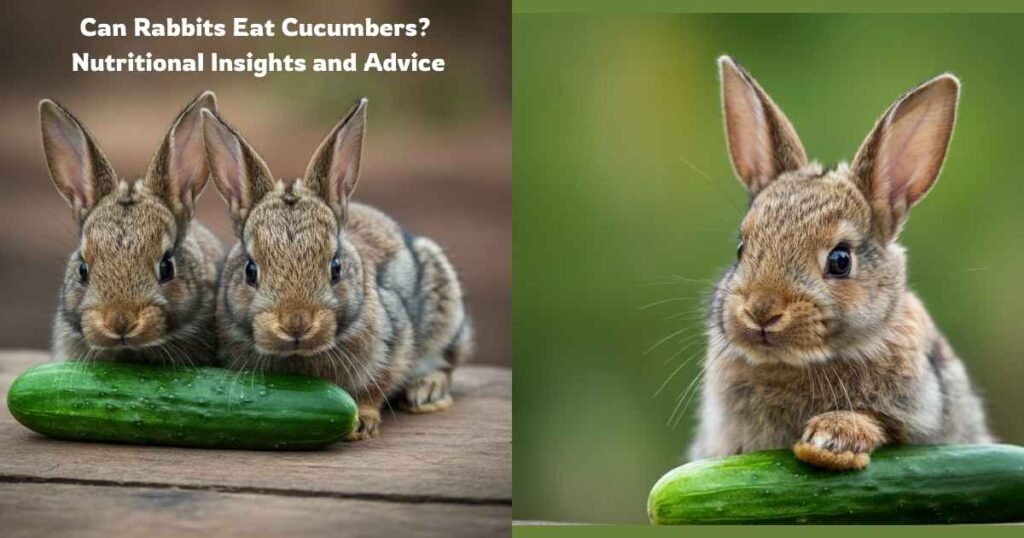“Can rabbits eat cucumbers ?“, When pondering the question, it’s essential to consider the salutary requirements of these small mammals. Cucumbers can serve as a hydrating snack due to their high water content and low caloric value. However, moderation is key, as too much cucumber might lead to digestive upset in rabbits. Including a variety of vegetables in a rabbit’s diet is important for providing a balance of essential nutrients. Therefore, understanding how cucumbers fit into their overall diet can help rabbit owners make informed feeding decisions.
Rabbits are herbivorous creatures adored for their unique dietary habits and fuzzy companionship. If you’re a rabbit owner, you’ve likely wondered if introducing cucumbers to their diet is a good idea. Can rabbits eat cucumbers, and if so, are they truly beneficial? The answer is n’t as straightforward as you might suppose. While cucumbers are a crisp, refreshing vegetable with nutritional value, they also come with potential risks that every rabbit owner should know. Below, we’ll unpack the ins and outs of feeding cucumbers to rabbits covering the benefits, risks, preparation tips, and much more to get the answer of “Can rabbits eat cucumbers”
Read: Sublime Genre: Echoes of Ethereal Soundscapes
Can rabbits eat cucumbers? A Comprehensive Guide
Can rabbits eat cucumbers ? Yes, rabbits can eat cucumbers, but there are essential factors to consider before offering this crunchy snack. Cucumbers contain high water content and valuable nutrients, making them a suitable treat, but they must be fed in moderation. Overfeeding cucumbers could lead to digestive issues for your furry friend. Understanding how cucumbers fit into a balanced diet is crucial for keeping your rabbit healthy and happy. This comprehensive guide will take you through everything you need to know about this topic.
The Benefits of Cucumbers in a Rabbit’s Diet
Cucumbers can indeed play a valuable role in your rabbit’s diet when fed responsibly. Here are some of their key benefits:
High-Water Content for Hydration
Cucumbers are composed of nearly 95% water, making them an excellent way to keep your rabbit hydrated, particularly during hot seasons. Often, rabbits have different hydration habits and may not drink enough water from their bowls. A couple of cucumber slices can act as a supplementary source of hydration.
Nutritional Value: Vitamins and Minerals
Cucumbers contain small amounts of essential vitamins like K and C, as well as minerals like potassium and magnesium. These nutrients contribute to healthy bone development, proper cardiovascular function, and muscle health in rabbits.
Low in Calories, Ideal for Weight Management
Cucumber is a low-calorie vegetable, which makes it perfect for rabbits needing a light treat. If your rabbit is on a calorie-regulated diet, cucumbers can provide some variation without contributing to unnecessary weight gain.
The Risks of Feeding Cucumbers to Rabbits
Though cucumbers have benefits, they must be served cautiously. Like any treat, they come with their share of risks if not handled correctly.
Digestive Issues from Overconsumption
Rabbits have sensitive digestive systems, and feeding too much cucumber could cause diarrhea or bloating. Its high water content—while excellent for hydration—can sometimes overwhelm their stomach if consumed in excessive quantities.
Oxalates and Their Impact on Rabbit Health
The skin of cucumbers contains oxalates, compounds that could contribute to calcium buildups and kidney stones when rabbits overconsume such foods. Although these risks primarily arise with large quantities, peeling cucumbers can reduce exposure to these harmful effects.
Safe Preparation and Serving Sizes of Cucumbers for Rabbits
Serving cucumbers safely is essential for reaping their benefits without causing harm. Here are some expert preparation tips for feeding cucumbers to your rabbits:
Washing and Peeling for Pesticides and Waxes
Cucumbers are often treated with pesticides or waxes, which can be harmful to rabbits. Always wash cucumbers thoroughly under running water to remove residual chemicals. Alternatively, peeling them provides an additional layer of safety.
Appropriate Serving Sizes to Avoid Digestive Problems
Given their water-dense composition, cucumbers should be provided as a supplement rather than a meal replacement. Two to three thin slices a few times per week are usually safe. Avoid feeding your rabbit an entire cucumber in one sitting.
Proper Storage for Freshness
Fresh cucumbers are always best for your rabbit. Store them in the fridge to maintain their crunchiness and discard any overly soft or discolored pieces, as they may harbor bacteria.
Monitoring Your Rabbit’s Response
Whenever you introduce a new food, including cucumbers, monitor your rabbit closely for changes in behavior or stool consistency. If any negative signs appear, discontinue feeding and consult a veterinarian.
Alternatives to Cucumbers for a Balanced Rabbit Diet
Rabbits thrive on variety. While cucumbers are great, they shouldn’t be the sole addition to a rabbit’s regular hay-based diet. Below are some excellent alternatives to ensure a well-rounded and nutritious diet.
Safe Vegetable and Herb Options
Some other common rabbit-friendly vegetables include:
- Bell peppers
- Zucchini
- Spinach
- Cilantro
- Romaine lettuce
Offering these options will ensure your rabbit isn’t reliant on a single treat for added nutrition. Herbs, in particular, are flavorful and nutrient-rich additions that your rabbit will likely enjoy.
Fruits as Occasional Treats
For extra variety, try offering small pieces of fruits like apples (seedless), bananas, or berries. Fruits should only account for 5–10% of your rabbit’s overall diet.
Tips for Introducing New Foods to Your Rabbit
When experimenting with new foods, always introduce them gradually—one at a time—with a few days in between to monitor how your rabbit reacts. Sudden changes could upset their digestive system.
Common Misconceptions About Feeding Cucumbers to Rabbits
Not everything you read about feeding cucumbers to rabbits is accurate. Let’s debunk some myths and clarify misconceptions to understand “Can rabbits eat cucumbers?”
Myth 1: Cucumbers Are a Complete Diet Replacement
While high in water, cucumbers cannot replace essential hay or pellets in a rabbit’s diet. They should be viewed as supplementary treats, not staples.
Myth 2: All Rabbits Like Cucumbers
Some rabbits may simply not enjoy the taste of cucumbers. Every rabbit has unique preferences, and forcing them to eat cucumbers is unnecessary if they opt for other vegetables.
Myth 3: Cucumbers Are the Best Hydration Source
Although beneficial for hydration, cucumbers should never replace fresh water. Always provide your rabbit with clean, accessible drinking water, regardless of how many water-rich foods they consume.
Real-Life Experiences and Advice from Rabbit Owners
Rabbit owners have diverse experiences with cucumbers. Then is what some of them have to say:
Anecdotal Evidence on How Rabbits Respond to Cucumbers
“I introduced cucumbers to my rabbit, Biscuit, and he loved them instantly. I offer him a slice or two alongside his daily greens—it keeps him hydrated!” – Sarah, a rabbit owner.
“My rabbit, Mochi, wasn’t a fan of cucumbers at first, but after trying a peeled version, she warmed up to them.” – Ivan, a pet enthusiast.
Tips from Experienced Rabbit Owners
- “Always peel cucumbers if your rabbit has a sensitive stomach.”
· “Introduce cucumbers alongside other veggies to see how your rabbit reacts.”
These real-life insights can serve as helpful advice for navigating your rabbit’s cucumber preferences.
The Importance of Variety in a Rabbit’s Diet
Cucumbers are great in moderation, but variety is key in maintaining a rabbit’s health. Here’s why:
- A balanced diet prevents nutrient deficiencies.
- Offering different textures and flavors keeps your rabbit engaged with their meals.
- A lack of variety can lead to picky eating habits, which are difficult to reverse.
Constantly Asked Questions About Feeding Cucumbers to Rabbits
1. Can rabbits eat cucumbers safely?
Yes, rabbits can eat cucumbers safely in moderation. Cucumbers should be offered as a supplementary treat in addition to their regular hay-based diet.
2. How often can I give cucumbers to my rabbit?
It’s recommended to feed your rabbit cucumbers two to three times a week, and only in small quantities typically a few thin slices per serving.
3. What are the potential risks of feeding cucumbers?
Feeding too many cucumbers can lead to digestive issues such as diarrhea due to their high water content. The skin also contains oxalates, which might contribute to health issues if consumed in large amounts.
4. Should cucumbers be peeled before giving them to rabbits?
Peeling cucumbers can reduce the risk of oxalate exposure and remove any residual pesticides or waxes, making them safer for your rabbit to consume.
5. Are cucumbers a good source of hydration for rabbits?
While cucumbers have a high water content and can aid in hydration, they should not replace fresh water. Always ensure your rabbit has access to plenty of clean drinking water.
6. Can cucumbers replace hay in a rabbit’s diet?
No, cucumbers cannot replace hay, which is essential for a rabbit’s digestive health. Cucumbers should only be considered a supplement to their primary diet of hay and pellets.
7. How can I introduce cucumbers to my rabbit’s diet?
Introduce cucumbers slowly and in small quantities, observing your rabbit’s reaction. Gradual introduction helps prevent digestive upsets.
8. What should I do if my rabbit shows signs of an adverse reaction after eating cucumbers?
If your rabbit exhibits any negative signs, such as diarrhea or changes in behavior, discontinue feeding cucumbers and consult a veterinarian.
9. What are alternatives to cucumbers for my rabbit’s diet?
Consider offering a range of vegetables and herbs such as bell peppers, zucchini, spinach, and cilantro, along with occasional fruit treats like apples and berries for variety.
10. Can rabbits eat cucumbers, is it normal?
Yes, just like humans, rabbits have individual preferences. If your rabbit does not seem to enjoy cucumbers, there is no need to force them to eat it. Provide other vegetables they enjoy instead.
Summing it up
Can rabbits eat cucumbers? Absolutely, as long as they’re prepared properly and given in moderation. Cucumbers can be a refreshing and nutritious addition to your rabbit’s diet, offering hydration and variety. However, they should not overshadow the importance of a well-rounded nutrition plan.
Introduce cucumbers gradually, watch for signs of digestive distress, and always prioritize variety. Your rabbit’s health and happiness depend on a thoughtful, balanced approach to their feeding routine. Have experience feeding cucumbers to your rabbit? Share your story in the comments!



